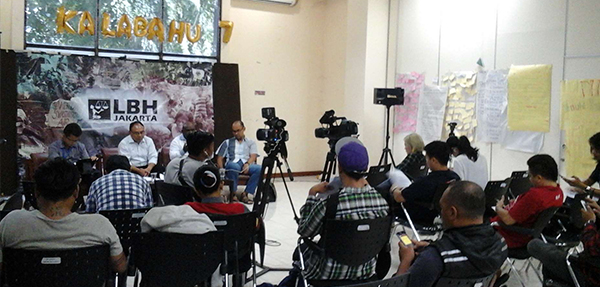A Jakarta based NGO of Legal Institute Aid (LBH Jakarta) reported that 1.783 West Papuans were unlawfully arrested from 25 April to 2 May 2016. On 2 May 2016, thousands of West Papuans conducted peaceful demonstrations simultaneously in Jayapura, Sorong, Merauke, Wamena, Semarang, Makassar and Manokwari.
The demonstrations were held in support of the ULMWP to be recognized as a full member of the Melanesian Spearhead Group (MSG), protested the commemoration of 1 May 1963 as Indonesia’s accession of West Papua, and to support the International Parliamentarians for West Papua (IPWP) forum in London on 3 May 2016 which will discuss international supervised referendum for West Papua.
In total, 1,735 people were unlawfully arrested Papua in just one day which is on 2 May 2016. The details are as follows: 1,449 people in Jayapura, 118 people in Merauke, 45 people in Semarang, 42 people in Makassar, 40 people in Fakfak, 27 people in Sorong and 14 people in Wamena. In Jayapura, police also arrested at least one child, delivered beatings to a journalist and numerous arrestees, and no less than a thousand of arrestees were forced to take their shirts off. The police beat and forbid journalists to cover in Jayapura and Fakfak.
Intimidation by the security forces existed in all areas where the demonstrations took place including in Kaimana and Manokwari, although the latter did not end up in arrest.
There were 1,783 people unlawfully arrested from 25 April 2016, the beginning of the preparation of the demonstration, to 2 May 2016. And since April 2016 to 2 May 2016, there were 1,846 people unlawfully arrested in Papua.
A Report on a Human Rights Fact Finding Mission to West Papua
The Catholic Justice and Peace Commission of the Archdiocese of Brisbane conducted a report on a human rights fact finding mission to West Papua. The report is result of a two week visit to West Papua in February 2016 made by two Australian prominent human rights defenders, Peter Arndt Executive Officer of the Catholic Justice and Peace Commission of Brisbane and Sister Susan Connoly from Sint Joseph Congregation.
The report entitling “We will lose everything” highlights the human rights violations in West Papua from 1960s up to present days.
The JPIC delegation met with eyewitnesses of the 1969 “act of free choice” who confirmed that the unanimous consent to integration of West Papua into the Indonesian Republic given by the 1022 Papuans involved was done so unwillingly and after much violence and intimidation by Indonesian security forces. In the decades that followed, Papuans continued to show their resistance and Indonesian security forces sought to quash it. Brutal repression by Indonesian security forces continues unabated today and the Commission’s delegation heard and saw evidence of on-going, systematic violence and intimidation including arrests, beatings, torture and killings of Papuans taking peaceful action to demonstrate their resistance to Indonesian occupation and their demand for an end to security forces violence.
The delegation also heard and saw evidence of the rapid demographic shift in West Papua resulting from the influx of Indonesian migrants into West Papua. It heard evidence of growing marginalisation of Papuans economically, socially and culturally. Many Papuans met by the delegation expressed immense desperation at the combined effect of their violent repression and marginalisation. An environment of great fear and desperation was clearly evident among the people. Many spoke of a slow motion genocide. Reports and investigations by many credible and respected international authorities confirm the concerns reported to the delegation. The delegation heard constantly that Papuans want their right to self-determination.
In the light of the delegation’s findings, the JPIC Commission of Brisbane recommends the following:
1) Governments in the Pacific, including the Australian Government, should seek intervention at the United Nations Human Rights Council and the United Nations General Assembly to initiate a credible, independent investigation into human rights violations in West Papua;
2) Governments in the Pacific should also pressure the Indonesian Government directly and seek the intervention of the United Nations to establish a dialogue between the Indonesian Government and the acknowledged leaders of the people of West Papua, the United Liberation Movement for West Papua in order to identify a credible pathway towards genuine self-determination for the people of West Papua;
3) Churches and civil society organisations in the Pacific should continue to build a network of solidarity with their counterparts in West Papua in order to support advocacy and action on human rights violations and the pursuit of self-determination by the people of West Papua and their leaders, the United Liberation Movement for West Papua;
4) The Australian Government should urgently consider the mounting evidence of involvement in human rights violations in West Papua by members of the Indonesian military, police force, including Detachment 8, and intelligence service. Based on this investigation, it should review any support, training and funding of any units involved in human rights violations in West Papua with a view to suspending such support until policy changes to end violations are implemented by the Indonesian Government.
The Brisbane Report has been launched in many cities of the world including Brisbane, Jayapura, Merauke, Jakarta, London and the capital cities of the Pacific Island countries. In Jakarta VIVAT Indonesia and the LBH Jakarta jointly launched the report on May 3rd, 2016 to the national media and CSOs.
Paul Rahmat SVD
